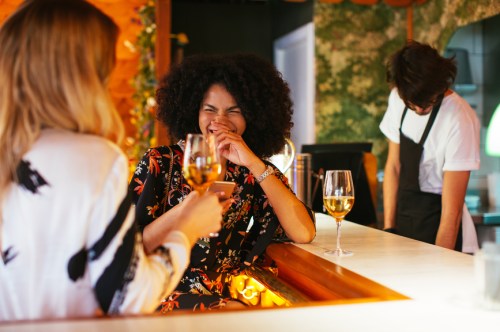Why a Urologist Says That ‘Breaking the Seal’ When Drinking Alcohol Is Actually a Huge Scam
Here, a urologist explains why the phenomenon of 'breaking the seal' of using the bathroom when drinking alcohol is a myth.

You don’t need to be an anatomy whiz to know that what goes in, must come out—and this is certainly true when it comes to drinking alcoholic beverages. So much so, in fact, that the urge to go pee when imbibing has inspired something of an old wives’ tale known as ‘breaking the seal.’
Experts in This Article
Richard A. Maiman, MD is a Urologist with the Advanced Urology Centers of New York.
ICYMI, when people say they’re going to ‘break the seal,’ they’re referring to the first time they go to the bathroom after drinking alcohol. This first pass reportedly then sets off a domino effect of needing to go again (and again, and again). “The concept is akin to breaking the seal on a container—i.e. your bladder—that cannot be resealed,” says urologist Richard A. Maiman, MD. “The theory is that the first time you urinate opens the floodgates to the increased urination we all associate with drinking alcohol.”
So… is there any truth to this anxiety-inducing phenomenon? In short, no. Here’s why.
Why breaking the seal is a myth, according to the urologist
According to Dr. Maiman, there’s no medical evidence to substantiate the claim that going to the bathroom once after you start drinking dooms you to urinate more frequently over the next several hours.
“People need to pee often when drinking alcohol because alcohol itself is a diuretic,” says Dr. Maiman. “The body makes a hormone called antidiuretic hormone (ADH), which causes your kidneys to reabsorb more water from the body, thereby leading to a lesser volume of fluid making it to the bladder as urine.” However, alcohol suppresses ADH, leading to less water reabsorption by the kidneys and thus more urine production. So, no, you have not broken some imaginary seal, but rather the alcohol is blocking your ADH production. “In addition to this, many people drink alcohol with caffeinated drinks like Red Bull and soda, which also have a diuretic effect.”
That said, while alcohol will make everyone pee more frequently, there’s a wide variability in how people are affected. “We don’t know exactly what makes some people’s bladders more sensitive than others to bladder irritants, but we do know that everyone metabolizes alcohol at different rates based on their body mass and levels of an enzyme called alcohol dehydrogenase. The faster your body metabolizes it, the sooner its effects on the ADH and your bladder will wear off.”
Alcohol can still be highly irritating to your bladder, though
The true long-term effects of alcohol on the bladder are not really known, but it’s accepted by the urologic community that alcohol is one of the most commonly consumed “bladder irritants.”
“Bladder irritants can cause general bladder discomfort as well as increase the strength and frequency with which the bladder contracts, leading not only to increased urinary frequency, but the sensation of urinary urgency—meaning strong desire to pee that comes on rapidly—and even urinary incontinence,” explains Dr. Maiman.
While there isn’t a way to prevent yourself from peeing more frequently from alcohol, Dr. Maiman says that you can do your best not to exacerbate it by avoiding combining alcohol and caffeine or spicy food, the two other most common bladder irritants. And, don’t hold your urine in when drinking to avoid breaking the seal! “That only leads to bladder overdistension, which can have a negative impact on overall bladder health.” Instead, follow the 20-second bladder rule when drinking and otherwise: If you find that you almost always pee for significantly less or more than 20 seconds, consider examining your bladder habits. Are you drinking too much (or too little) water, alcohol, or caffeine at happy hour? Are you giving yourself enough bathroom breaks as you sip and socialize? Or are you using the bathroom more than you need to because it’s the only private place at the cocktail party? Your answers can help you to tweak your bladder habits.
You can also try eating more of these bladder-friendly foods while you’re at it.
Oh hi! You look like someone who loves free workouts, discounts for cutting-edge wellness brands, and exclusive Well+Good content. Sign up for Well+, our online community of wellness insiders, and unlock your rewards instantly.
Sign Up for Our Daily Newsletter
Get all the latest in wellness, trends, food, fitness, beauty, and more delivered right to your inbox.
Got it, you've been added to our email list.










